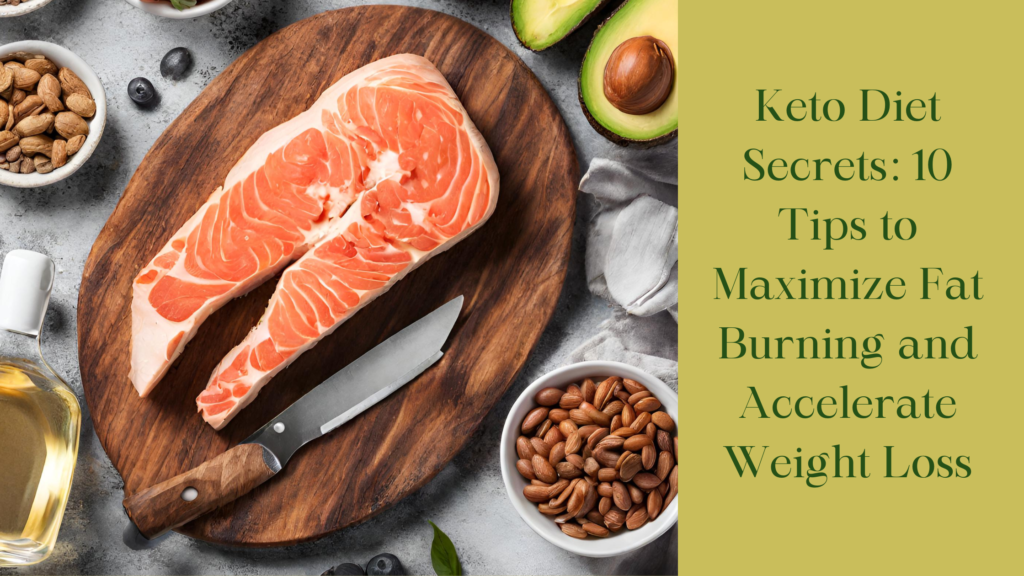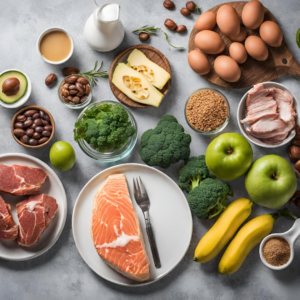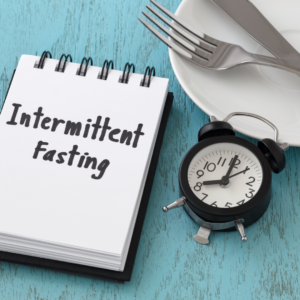Keto Diet Secrets: 10 Tips to Maximize Fat Burning and Accelerate Weight Loss

Are you tired of struggling to shed those extra pounds? Have you tried countless diets without seeing any significant results? If so, it’s time to unveil the secrets behind the keto diet and supercharge your weight loss journey.
In this article, we’ll explore 10 expert tips that will maximize fat burning, accelerate your weight loss, and unlock the full potential of the keto diet. From understanding the fundamentals of the keto lifestyle to incorporating intermittent fasting and managing electrolyte imbalances, we’ve got you covered. Get ready to optimize your fat-burning potential, boost your energy levels, and overcome common pitfalls along the way. It’s time to take control of your weight loss goals and start seeing real, lasting results. So, let’s dive in and discover the insider secrets to a successful keto lifestyle.
Understanding the Keto Diet:
To fully understand the principles behind the keto diet and effectively apply them to your weight loss journey, it’s crucial to start by setting realistic goals. Tip 1: Set Realistic Goals will provide you with the foundation you need to navigate the keto lifestyle successfully. By establishing attainable objectives, you can create a roadmap for your weight loss efforts and ensure that you stay motivated and focused throughout the process.,
Tip 1: Set Realistic Goals
To fully understand the principles behind the keto diet and effectively apply them to your weight loss journey, it’s crucial to start by setting realistic goals. By doing so, you lay the foundation needed to navigate the keto lifestyle successfully. Setting realistic goals provides you with a clear roadmap for your weight loss efforts and ensures that you stay motivated and focused throughout the process.
When it comes to weight loss, setting realistic goals is essential for long-term success. It’s easy to get caught up in the excitement of embarking on a new diet and setting ambitious expectations for yourself. However, it’s important to remember that sustainable weight loss takes time and effort. By setting realistic goals, you can avoid the disappointment and frustration that come with expecting instant results.
One way to set realistic goals on the keto diet is by focusing on the process rather than solely on the outcome. Instead of fixating on a specific number on the scale, consider setting goals related to adherence to the diet itself. For example, you could aim to consistently track your macros or stick to a certain number of net carbs each day. These process-oriented goals not only help you stay on track but also contribute to your overall progress.
Get the benefits of Alpha Tonic today!
Another key aspect of setting realistic goals is making them attainable. While it’s great to have big aspirations, it’s important to break them down into smaller, achievable steps. By setting smaller milestones along the way, you can celebrate your progress and stay motivated. For instance, if your ultimate goal is to lose 50 pounds, consider breaking it down into smaller goals of losing 5 or 10 pounds at a time. This approach allows you to see tangible results and keeps you motivated to continue moving forward.
Furthermore, it’s essential to set goals that align with your individual circumstances and lifestyle. Everyone’s weight loss journey is unique, and what works for one person may not work for another. Consider factors such as your current health, activity level, and personal preferences when setting your goals. By tailoring your objectives to fit your specific situation, you increase the likelihood of achieving them and maintaining your progress in the long run.
By setting realistic goals on the keto diet, you establish a solid foundation for your weight loss journey. These goals not only provide you with a clear roadmap but also help you stay motivated and focused throughout the process. As you embark on your keto lifestyle, remember to break down your goals into achievable steps, focus on the process, and tailor your objectives to your unique circumstances. With realistic goals in place, you’ll be well on your way to maximizing fat burning and accelerating weight loss.
Setting realistic goals is just the beginning. Now, let’s move on to Tip 2: Prioritize Healthy Fats, where we’ll delve into the importance of incorporating healthy fats into your keto diet for optimal results.,
Tip 2: Prioritize Healthy Fats
+ Setting realistic goals is just the beginning. Now, let’s move on to Tip 2: Prioritize Healthy Fats, where we’ll delve into the importance of incorporating healthy fats into your keto diet for optimal results.
Setting realistic goals is just the beginning. Now, let’s move on to Tip 2: Prioritize Healthy Fats, where we’ll delve into the importance of incorporating healthy fats into your keto diet for optimal results.
While it may seem counterintuitive, consuming healthy fats is a fundamental aspect of the ketogenic diet. By focusing on healthy fat sources, you not only enhance the flavor and satiety of your meals but also provide your body with the necessary fuel to burn stored fat for energy. Remember, the keto diet is all about shifting your body into a state of ketosis, where it relies on fat as its primary source of fuel instead of carbohydrates.
When prioritizing healthy fats, it’s essential to choose those that promote overall well-being. Opt for sources such as avocados, nuts and seeds, olive oil, coconut oil, and fatty fish like salmon and tuna. These fats not only provide essential nutrients but also contain monounsaturated and polyunsaturated fats, which have been shown to support heart health and reduce inflammation in the body.
Incorporating healthy fats into your meals is surprisingly easy. Add sliced avocado to your salads, use olive oil as a dressing or for cooking, snack on a handful of nuts, and include fatty fish in your weekly meal plan. Not only will these additions enhance the taste and texture of your meals, but they will also keep you feeling satisfied and full for longer periods, reducing the temptation for unhealthy snacks or overeating.
Remember, the key to success on the keto diet is to maintain a consistent state of ketosis. Prioritizing healthy fats provides your body with the necessary fuel to stay in ketosis and maximize fat burning. By making these simple adjustments to your meals and snacks, you’ll be well on your way to achieving your weight loss goals.
Now that you understand the importance of healthy fats, let’s move on to Tip 3: Monitor Protein Intake, where we’ll explore the role of protein and its impact on your keto journey.,
Tip 3: Monitor Protein Intake
Now that you understand the importance of healthy fats, let’s move on to Tip 3: Monitor Protein Intake, where we’ll explore the role of protein and its impact on your keto journey.
Protein is a crucial macronutrient for our bodies. It plays a significant role in building and repairing tissues, supporting immune function, and maintaining muscle mass. However, when it comes to the keto diet, finding the right balance of protein is essential.
Consuming too much protein can potentially disrupt ketosis and hinder your weight loss progress. This is because excessive protein intake can be converted into glucose through a process called gluconeogenesis. Glucose can then be used by our bodies as a source of energy, shifting us out of the desired fat-burning state of ketosis.
On the other hand, not consuming enough protein can lead to muscle loss and a weakened immune system. It’s crucial to find the sweet spot that supports your weight loss goals while still providing the necessary nutrients for overall health.
To monitor your protein intake on the keto diet, it’s recommended to aim for a moderate amount of protein each day. Individual protein needs can vary, but a general guideline is to consume around 0.6 to 0.8 grams of protein per pound of lean body mass.
Lean body mass refers to your total weight minus your body fat. This calculation helps ensure that you are providing your body with enough protein to support muscle maintenance without going overboard.
Remember, the key to success on the keto diet is to maintain a consistent state of ketosis. Prioritizing healthy fats provides your body with the necessary fuel to stay in ketosis and maximize fat burning. By making these simple adjustments to your meals and snacks, you’ll be well on your way to achieving your weight loss goals.
Now that you have a better understanding of protein’s role on the keto diet, let’s move on to Tip 4: Stay Hydrated, a critical aspect of optimizing your weight loss journey.,
Tip 4: Stay Hydrated
 Now that you have a better understanding of protein’s role on the keto diet, let’s move on to Tip 4: Stay Hydrated, a critical aspect of optimizing your weight loss journey. Just like on any diet, proper hydration is essential for overall health, but it becomes even more important on the keto diet.
Now that you have a better understanding of protein’s role on the keto diet, let’s move on to Tip 4: Stay Hydrated, a critical aspect of optimizing your weight loss journey. Just like on any diet, proper hydration is essential for overall health, but it becomes even more important on the keto diet.
When you’re in a state of ketosis, your body is burning stored fat for fuel instead of carbohydrates. This process produces ketones, which can cause dehydration if not properly managed. That’s why it’s crucial to make sure you’re staying hydrated throughout the day.
Drinking enough water is key to ensuring your body functions optimally while on the keto diet. Water helps with digestion, absorption, and transportation of nutrients, all of which contribute to effective weight loss. It also aids in regulating body temperature, lubricating joints, and maintaining healthy skin.
In addition to drinking plain water, you can also incorporate other hydrating beverages such as herbal tea or electrolyte-infused water. Electrolytes, like sodium, potassium, and magnesium, are especially important on the keto diet as they help maintain proper fluid balance in the body.
It’s important to note that staying hydrated doesn’t mean solely relying on beverages. Many foods, such as cucumbers, lettuce, and zucchini, have high water content and can contribute to your overall hydration. Aim to include these water-rich foods in your meals and snacks to supplement your fluid intake.
By prioritizing hydration, you’re not only supporting your body’s ability to stay in ketosis and burn fat but also promoting overall well-being. So, grab that water bottle, sip on some herbal tea, and keep your hydration levels in check as we move on to Tip 5: Incorporate Intermittent Fasting, another effective strategy to accelerate your weight loss journey.,
Tip 5:Incorporate Intermittent Fasting
 By prioritizing hydration, you’re not only supporting your body’s ability to stay in ketosis and burn fat but also promoting overall well-being. So, grab that water bottle, sip on some herbal tea, and keep your hydration levels in check as we move on to Tip 5: Incorporate Intermittent Fasting, another effective strategy to accelerate your weight loss journey.
By prioritizing hydration, you’re not only supporting your body’s ability to stay in ketosis and burn fat but also promoting overall well-being. So, grab that water bottle, sip on some herbal tea, and keep your hydration levels in check as we move on to Tip 5: Incorporate Intermittent Fasting, another effective strategy to accelerate your weight loss journey.
Intermittent fasting has gained popularity for its potential benefits in weight loss and overall health. This eating pattern involves cycling between periods of fasting and eating, essentially extending the natural fasting state that occurs overnight. By incorporating intermittent fasting into your keto diet routine, you can further enhance fat-burning and maximize weight loss results.
One of the main reasons intermittent fasting works well with the keto diet is that it helps deplete glycogen stores in the body more efficiently. During fasting periods, when your body is low on glycogen, it turns to fat stores for energy, aiding in the production of ketones and promoting fat burning.
Additionally, intermittent fasting can help regulate insulin levels and improve insulin sensitivity. This is crucial for individuals on a keto diet, as insulin sensitivity plays a vital role in fat storage and metabolism. By reducing insulin resistance through intermittent fasting, you can optimize your body’s ability to burn fat and maintain ketosis.
There are different approaches to intermittent fasting, and you can tailor it to suit your lifestyle and preferences. One popular method is the 16/8 protocol, where you fast for 16 hours and confine your eating window to 8 hours of the day. This typically involves skipping breakfast and consuming all your daily meals within a specific time frame. Another approach is the 5:2 method, where you eat normally for five days of the week and restrict your calorie intake to 500-600 calories for the remaining two days.
While intermittent fasting can be an effective strategy for weight loss, it’s important to listen to your body and consult with a healthcare professional if you have any underlying health conditions. It’s not recommended for everyone, especially those with certain medical conditions or women who are pregnant or breastfeeding.
In summary, incorporating intermittent fasting into your keto diet can provide an extra boost to your weight loss efforts. By depleting glycogen stores, enhancing fat burning, and improving insulin sensitivity, intermittent fasting serves as an effective complement to the ketogenic lifestyle. Now that you’re familiar with this powerful tip, let’s dive into Tip 6: Include Moderate Exercise, another key component in accelerating your weight loss journey.,
Tip 6:Include Moderate Exercise
 Incorporating intermittent fasting into your keto diet can provide an extra boost to your weight loss efforts. By depleting glycogen stores, enhancing fat burning, and improving insulin sensitivity, intermittent fasting serves as an effective complement to the ketogenic lifestyle. Now that you’re familiar with this powerful tip, let’s dive into Tip 6: Include Moderate Exercise, another key component in accelerating your weight loss journey.
Incorporating intermittent fasting into your keto diet can provide an extra boost to your weight loss efforts. By depleting glycogen stores, enhancing fat burning, and improving insulin sensitivity, intermittent fasting serves as an effective complement to the ketogenic lifestyle. Now that you’re familiar with this powerful tip, let’s dive into Tip 6: Include Moderate Exercise, another key component in accelerating your weight loss journey.
Exercise is an essential aspect of any successful weight loss plan, and when combined with the keto diet, it can help maximize fat burning and accelerate your progress towards your weight loss goals. While diet plays a crucial role in shedding those extra pounds, incorporating moderate exercise into your routine can further enhance the benefits of the ketogenic lifestyle.
When engaging in moderate exercise, you’re not just burning calories; you’re also boosting your metabolism, which aids in the fat-burning process. By elevating your heart rate and engaging in activities that challenge your muscles, you’re not only improving your physical fitness but also increasing your body’s ability to burn fat.
One of the significant advantages of including moderate exercise in your keto journey is that it helps preserve lean muscle mass. When you lose weight, your body can sometimes burn both fat and muscle. However, by engaging in regular exercise, you can minimize muscle loss and maintain a toned physique while shedding unwanted fat.
Moreover, exercise contributes to improved insulin sensitivity, which is beneficial for individuals following the keto diet. By increasing insulin sensitivity, your body becomes more efficient at utilizing carbohydrates and managing blood sugar levels. This, in turn, supports the overall effectiveness of the ketogenic lifestyle, helping you achieve your weight loss goals faster.
Remember, when incorporating exercise into your keto diet, it’s essential to find a balance that works best for your body and lifestyle. Listen to your body’s cues and start slow if you’re new to exercising or haven’t been active for a while. Gradually increase the intensity and duration of your workouts as your fitness level improves.
Now that you have a good understanding of the benefits of moderate exercise in conjunction with the keto diet, let’s move on to Tip 7: Manage Electrolyte Imbalance, which will help you maintain optimal health and prevent any potential imbalances that may arise from your dietary choices.,
Tip 7: Manage Electrolyte Imbalance
 Now that you have a good understanding of the benefits of moderate exercise in conjunction with the keto diet, let’s move on to Tip 7: Manage Electrolyte Imbalance, which will help you maintain optimal health and prevent any potential imbalances that may arise from your dietary choices.
Now that you have a good understanding of the benefits of moderate exercise in conjunction with the keto diet, let’s move on to Tip 7: Manage Electrolyte Imbalance, which will help you maintain optimal health and prevent any potential imbalances that may arise from your dietary choices.
Following a keto diet often means consuming low levels of carbohydrates, which can lead to a shift in your body’s electrolyte balance. Electrolytes, such as sodium, potassium, and magnesium, play a crucial role in maintaining proper fluid balance, nerve function, and muscle contractions. When on a keto diet, your body tends to excrete more water and sodium, which can potentially result in an electrolyte imbalance.
To manage electrolyte imbalance, it’s important to focus on replenishing these essential minerals. Incorporating foods rich in electrolytes, such as leafy greens, avocados, nuts, and seeds, can help ensure you maintain adequate levels. Additionally, adding a pinch of sea salt to your meals or drinking a cup of bone broth can provide a quick boost of sodium, which may help prevent symptoms of electrolyte imbalance, such as muscle cramps or headaches.
Supplementation can also be beneficial, especially if you’re experiencing symptoms of electrolyte imbalance despite your dietary efforts. Consider taking magnesium, potassium, or sodium supplements under the guidance of a healthcare professional. However, it’s important not to overdo it with supplementation, as excessive amounts can have adverse effects.
Remember, managing electrolyte imbalance is crucial for maintaining optimal health while on a keto diet. By paying attention to your body’s signals and ensuring you’re replenishing these essential minerals, you can prevent imbalances and continue to maximize your fat-burning potential.
Now that you’ve learned how to manage electrolyte imbalance, let’s move on to Tip 8: Get Quality Sleep, which plays a significant role in supporting your weight loss and overall well-being.,
Tip 8: Get Quality Sleep
 Now that you’ve learned how to manage electrolyte imbalance, let’s move on to Tip 8: Get Quality Sleep, which plays a significant role in supporting your weight loss and overall well-being.
Now that you’ve learned how to manage electrolyte imbalance, let’s move on to Tip 8: Get Quality Sleep, which plays a significant role in supporting your weight loss and overall well-being.
Getting enough sleep is often overlooked when it comes to weight loss, but it is an essential factor that can greatly impact your results on the keto diet. Quality sleep not only helps you feel refreshed and energized, but it also plays a crucial role in regulating your metabolism and hormones.
During sleep, your body goes through various processes to repair and regenerate. This includes muscle growth and tissue repair, which are important for preserving lean muscle mass while you burn fat. Inadequate sleep, on the other hand, can lead to muscle loss and a slower metabolism, making it more challenging to achieve your weight loss goals.
Furthermore, lack of sleep can disrupt your hormonal balance. It can increase the production of cortisol, a stress hormone that can promote the breakdown of muscle tissue and hinder fat burning. In addition, insufficient sleep can affect the production of appetite-regulating hormones like leptin and ghrelin, leading to an increased appetite and cravings for unhealthy foods.
To ensure you get quality sleep while on the keto diet, establish a regular sleep schedule and stick to it as much as possible. Aim for seven to nine hours of uninterrupted sleep each night. Create a relaxing bedtime routine that includes activities like reading, taking a warm bath, or listening to calming music to help signal your body that it’s time to wind down.
It’s also important to create an environment that promotes optimal sleep. Keep your bedroom dark, cool, and quiet, and consider investing in a comfortable mattress and pillows that support your body’s needs. Avoid stimulating activities and the use of electronic devices before bed, as the blue light they emit can interfere with your sleep quality.
By prioritizing quality sleep, you’ll not only support your weight loss efforts but also improve your overall well-being. As we move on to Tip 9: Practice Mindful Eating, remember that getting enough restful sleep sets the foundation for making healthy food choices and being mindful of your eating habits.,
Tip 9: Practice Mindful Eating
 By prioritizing quality sleep, you’ll not only support your weight loss efforts but also improve your overall well-being. As we move on to Tip 9: Practice Mindful Eating, remember that getting enough restful sleep sets the foundation for making healthy food choices and being mindful of your eating habits.
By prioritizing quality sleep, you’ll not only support your weight loss efforts but also improve your overall well-being. As we move on to Tip 9: Practice Mindful Eating, remember that getting enough restful sleep sets the foundation for making healthy food choices and being mindful of your eating habits.
When it comes to fat-burning and accelerating weight loss, what you put into your body is just as important as how much you eat. Mindful eating is a practice that can help you become more aware of your body’s hunger and fullness cues, as well as your emotions and cravings.
Mindful eating begins with slowing down and savoring each bite. It’s about taking the time to truly enjoy your food, instead of mindlessly scarfing it down. This can be challenging in our fast-paced world, but it’s worth the effort.
One strategy to practice mindful eating is to eliminate distractions during mealtime. Instead of eating while scrolling through social media or watching TV, carve out dedicated time to sit down and focus solely on your meal. This allows you to fully engage with the sensory experience of eating and appreciate the flavors, textures, and aromas of your food.
Another aspect of mindful eating is listening to your body’s signals of hunger and fullness. Pay attention to when you start to feel satisfied, and stop eating before you reach the point of being uncomfortably full. This can help prevent overeating and promote more balanced eating habits.
Additionally, mindful eating involves being aware of your emotions and cravings. Are you reaching for that bag of chips because you’re actually hungry, or because you’re feeling stressed or bored? Taking a moment to pause and reflect on your emotions before diving into snacks can help you make more conscious choices.
Practicing mindful eating can enhance your keto diet journey by allowing you to truly connect with the foods you eat and how they make you feel. It encourages a more intuitive approach to eating, where you listen to your body’s needs and nourish it accordingly.
Now, armed with the knowledge of mindful eating, let’s move on to Tip 10: Seek Professional Guidance, where we’ll explore the value of consulting with a healthcare professional or registered dietitian for personalized support on your weight loss journey.,
Tip 10: Seek Professional Guidance
 Now, armed with the knowledge of mindful eating, let’s move on to Tip 10: Seek Professional Guidance, where we’ll explore the value of consulting with a healthcare professional or registered dietitian for personalized support on your weight loss journey.
Now, armed with the knowledge of mindful eating, let’s move on to Tip 10: Seek Professional Guidance, where we’ll explore the value of consulting with a healthcare professional or registered dietitian for personalized support on your weight loss journey.
Embarking on a new diet can be overwhelming, especially when it comes to understanding the specific dietary needs and possible challenges that may arise. While the internet and various resources can provide a wealth of information, there’s no substitute for the expertise and personalized guidance offered by qualified professionals in the field.
A healthcare professional or registered dietitian who specializes in ketogenic diets can provide you with the necessary tools and knowledge to maximize your fat burning potential while ensuring you remain healthy and balanced. They can help you navigate through the complexities of the keto diet, offering tailored advice based on your unique body composition, health history, and weight loss goals.
Seeking professional guidance is especially crucial if you have any pre-existing health conditions or if you’re taking medications that may interact with the keto diet. A healthcare professional or registered dietitian will be able to assess your specific situation and provide you with personalized recommendations to ensure your safety and optimize your results.
Beyond addressing any potential risks or concerns, consulting with a professional can also help you overcome plateaus or challenges that may arise during your weight loss journey. They can provide invaluable insights, support, and motivation to keep you on track and ensure you’re making progress towards your goals.
Moreover, a healthcare professional or registered dietitian can help you develop a sustainable approach to the keto diet that aligns with your lifestyle and long-term health objectives. They can guide you in creating a well-rounded meal plan that includes a variety of nutrient-dense foods, ensuring you receive all the essential vitamins, minerals, and macronutrients your body needs for optimal function.
By seeking professional guidance, you are investing in your own success. The expertise and personalized support offered by these professionals can make a significant difference in your ability to stick to the keto diet, achieve your weight loss goals, and maintain a healthy lifestyle moving forward.
while the keto diet can be a powerful tool for weight loss and fat burning, seeking professional guidance is essential to ensure you’re following the diet safely and effectively. Consulting with a healthcare professional or registered dietitian can provide you with the personalized support, knowledge, and motivation you need to succeed on your keto diet journey. So don’t hesitate to reach out to these experts and take advantage of their expertise—they can help you achieve your goals and transform your life for the better.,
Mastering the art of the keto diet requires a combination of knowledge, discipline, and persistence. By understanding the underlying principles and following these 10 expert tips, you can accelerate your fat-burning and achieve your weight loss goals with remarkable success. Remember, setting realistic goals, prioritizing healthy fats, monitoring protein intake, staying hydrated, incorporating intermittent fasting,
Incorporating moderate exercise, managing electrolyte imbalances, getting quality sleep, practicing mindful eating, and seeking professional guidance are the keys to optimizing your results. Don’t wait another day to take action and embark on your keto journey. Embrace these secrets, harness the power of your body’s natural fat-burning potential, and unlock a healthier, more vibrant version of yourself. As the saying goes, “Success is not final; failure is not fatal; it is the courage to continue that counts.” So, take that courage and start maximizing your weight loss efforts with the keto diet today.
Read what others are saying and decide for yourself >>>
FAQ:
1. Why is setting realistic goals crucial to the keto diet?
Setting realistic goals provides a clear roadmap for navigating the keto lifestyle, ensuring motivation and focus throughout the weight loss journey. It prevents disappointment and frustration by promoting a sustainable and achievable approach.
2. How does prioritizing healthy fats contribute to the success of the keto diet?
Prioritizing healthy fats enhances flavor, satiety, and provides the necessary fuel for the body to burn stored fat. This approach supports the state of ketosis, where the body relies on fat as the primary source of energy, optimizing the effectiveness of the keto diet.
3. Why is monitoring protein intake essential for individuals on the keto diet?
Monitoring protein intake helps maintain a balance that supports weight loss goals without hindering ketosis. Excessive protein can be converted into glucose, disrupting the fat-burning state, while insufficient protein may lead to muscle loss and compromised immune function.
4. How does staying hydrated play a critical role in optimizing weight loss on the keto diet?
Staying hydrated is essential to counteract potential dehydration caused by ketosis. Proper hydration supports digestion, nutrient transportation, and effective weight loss. Electrolyte-infused water and hydration through water-rich foods contribute to maintaining optimal fluid balance.
5. What benefits does incorporating intermittent fasting provide in conjunction with the keto diet?
- Intermittent fasting enhances fat burning by depleting glycogen stores more efficiently and improving insulin sensitivity. It complements the ketogenic lifestyle, promoting ketone production and efficient energy utilization. Different approaches, such as the 16/8 protocol, offer flexibility to suit individual preferences and lifestyles.